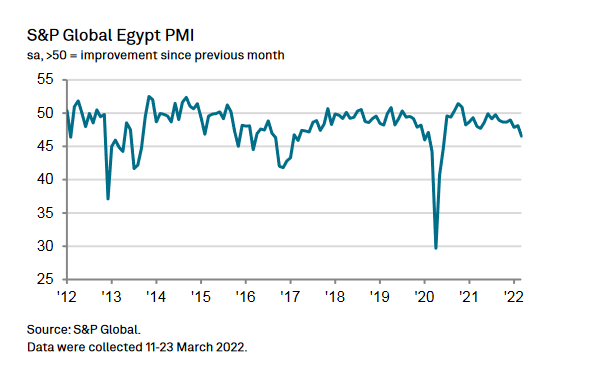Egypt PMI falls to 21-month low in March as Russia-Ukraine war weighs on
Egypt’s non-oil economy suffered a strong decline in business conditions in March, with its Purchasing Managers’ Index (PMI) falling to 21-month low, a survey showed on Tuesday.
The S&P Global Egypt Purchasing Managers’ Index fell to 46.5 from February’s 48.1, its 16th month below the 50.0 threshold that separates growth from contraction.

The “amplifying of inflationary pressures on energy, food and raw materials amid the Russia-Ukraine war led to sharp decreases in output and new orders.” S&P Global survey read.
S&P Global economist David Owen said in the survey: “The non-oil economy was clearly hit by the effects of the Russia-Ukraine war during March, with firms often seeing clients pull new orders back amid increased prices and economic uncertainty,”
Higher global food and raw materials prices led to sharp falls in output and new orders, with the sub-index for overall input prices jumping to 58.6 from 54.5 in February and that for purchase costs inching up to 59.1 from 55.9.
“Egyptian firms reacted to higher prices and lower demand by severely reducing their purchasing activity at the end of the first quarter,” S&P Global added.
“More than a third of respondents reported a decrease in input buying, marking the sharpest decline in overall purchases for almost two years.” the survey noted.
Output and new orders in March extended a months-long contraction, with the output index edging down to 44.6 from 46.1 in February and that for new orders dropping to 45.1 from 47.3.
The sub-index for future output expectations slid to 52.5, its lowest since it was first included in the survey in April 2012, from 55.4 in February.
“While the 14% devaluation of the Egyptian pound on 21 March may provide some short-term support for the economy, it will also likely accelerate cost pressures. Some firms have already seen a rise in import prices which could constrain output and force a greater increase in selling charges.” Owen concluded.


